Articles
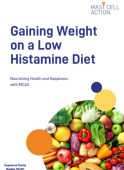
Gaining Weight on a Low Histamine Diet
From our Nourishing Health & Happiness with MCAS series — gentle, practical ideas for maintaining or gaining weight while following a low histamine approach.

Gaining Weight on a Low Dairy Diet
From our Nourishing Health & Happiness with MCAS series, discover nourishing, dairy-free or low dairy ways to support healthy weight gain while meeting your body’s needs.

Eating enough fibre with MCAS
From our Nourishing Health & Happiness with MCAS series — discover simple, gentle ways to include more fibre for better gut health and overall wellbeing.

A Quick Guide to MCAS
A handy 2 page Quick Guide to MCAS. An easy to read and understand overview of mast cells, MCAS symptoms, triggers, management, treatment and the histamine bucket theory.

Mast Cells and Relationships: Naviagtion and Education
PowerPoint slides from Roselle O'Brien's webinar 'Mast Cells and Relationships: Navigation and Education'.
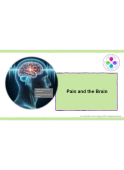
Pain and the Brain
PowerPoint slides from Deborah Bircham from Live Well with Chronic Illness' Webinar 'Pain and the Brain'.

Compassion as a Healing Tool
PowerPoint slides from Deborah Bircham's from Live Well with Chronic Illness webinar 'Compassion as a Healing Tool'. You can find the recording of this session on our YouTube channel.
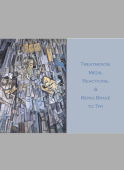
Treatments: Meds, Reactions, & Being Brave to Try
PowerPoint Slides from Roselle O'Brien's webinar 'Treatments: Meds, Reactions, & Being Brave to Try'. You can find the recording of this session on our YouTube channel.
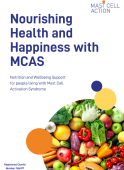
Nourishing Health and Happiness with MCAS
We have worked with registered dietitian, Chloe Hall, to explore some of the most common diets followed by people with MCAS, and the key nutritional concerns that often arise. In this resource, we’ll look at practical ways to support your diet when living with MCAS.

Mast Cells and Relationships: The Garden of Self
PowerPoint slides from Roselle O'Brien's webinar 'Mast Cells and Relationships: The Garden of Self'. You can find the recording of this session on our YouTube channel.

EDS and MCAS from an Osteopathic perspective: How can Osteopathy help you?
PowerPoint slides from Rory Boggett's webinar 'EDS and MCAS from an Osteopathic perspective: How can Osteopathy help you?'.

MCAS and Menopause Workbook
This workbook is designed to go along with our 'Mastering Menopause: Working through Menopause for those with MCAS' webinar hosted by Rebecca Fredericks.
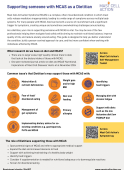
Supporting someone with MCAS as a Dietitian
Supporting Someone with MCAS as a Dietitian is a practical resource designed to help dietitians understand and support people living with Mast Cell Activation Syndrome. It offers guidance on the unique challenges that MCAS presents, particularly around food, nutrition, and symptom management.

Building Resilience with MCAS: Self Care, Sleep and Emotional Wellbeing
PowerPoint slides from Rebecca Fredericks webinar 'Building Resilience with MCAS: Self Care, Sleep and Emotional Wellbeing'.

Building Resilience with MCAS: Self-Care, Sleep, and Emotional Wellbeing Workbook
This workbook is to go alongside the session on Building Resilience with MCAS: Self-Care, Sleep, and Emotional Wellbeing hosted by Rebecca Fredericks.

Mast Cells and The Mind
A PDF to support our session on mast cells and the mind by Deborah Bircham
Prevalence of mast cell activation disorders and hereditary alpha tryptasemia among patients with postural orthostatic tacycardia syndrome and Ehlers-Danlos syndrome: A systematic review
Matthew Farley, Ricardo J. Estrada-Medisabel, Emily A. Gansert, Dayne Voelker, Lisa A. Marks, Alexei Gonzalez-Estrada (2025). This article systematically reviews the prevalence of mast cell activation disorders (MCADs) and hereditary alpha tryptasemia (HAT) in patients with postural orthostatic tachycardia syndrome (POTS) and Ehlers-Danlos syndrome (EDS). It finds that no studies that met strict diagnostic criteria confirm a clear association. Despite anecdotal reports and individual studies suggesting potential overlap between these conditions, most existing research lacked validated diagnostic standards and consistency. The article concludes that more rigorous, well-designed studies are needed to determine whether a true clinical relationship exists among POTS, EDS, MCADs, and HAT.
Prevalence and treatment response of neuropsychiatric disorders in mast cell activation syndrome
Leonard B. Weinstock , Lawrence B. Afrin, Angela M. Reierson, Jill Brook, Svetlana Blitshteyn, Gillian Ehrlich, Jill R. Schofield, Laurence Kinsella, David Kaufman, Tania Dempsey, Gerhard J. Molderings (2025). This article investigates the prevalence of a variety of neuropsychiatric manifestations in MCAS patients in comparison to healthy controls. It finds that MCAS patients have high rates of self-reported neuropsychiatric disorders and symptoms compared to healthy age-matched controls. The study suggests that MCAS subjects may see improvement in comorbid neuropsychiatric disorders using MCAS-targeted therapies, and that genetic predisposition, life experience and mast cell mediators determine which neuropsychiatric conditions have potential to develop.

Seated Pilates Guide
This Seated Pilates guide has been designed especially for those living with Mast Cell Activation Syndrome (MCAS). Leanne is a Pain-Free Movement Specialist and Pilates Teacher with lived experience of multiple chronic illnesses. To use this guide, you might like to pick out an exercise, try it, see how you feel and then if you have no adverse effects try another.

Speaking to Your GP: Language and Tips for Effective Communication
This guide has been created to help you communicate more confidently and effectively with your GP. It offers practical language suggestions that can help you explain your symptoms, request support, and build a more collaborative relationship, whether you have a confirmed diagnosis or are still seeking answers.
Become a friend
Sign up to become a Friend of Mast Cell Action so we can keep you up to date on our progress and on how to get involved in our latest campaigns and initiatives.
Donate
Mast Cell Action relies entirely on the generosity of people like you. Please make a donation now and together we can make a difference to those affected by MCAS.







